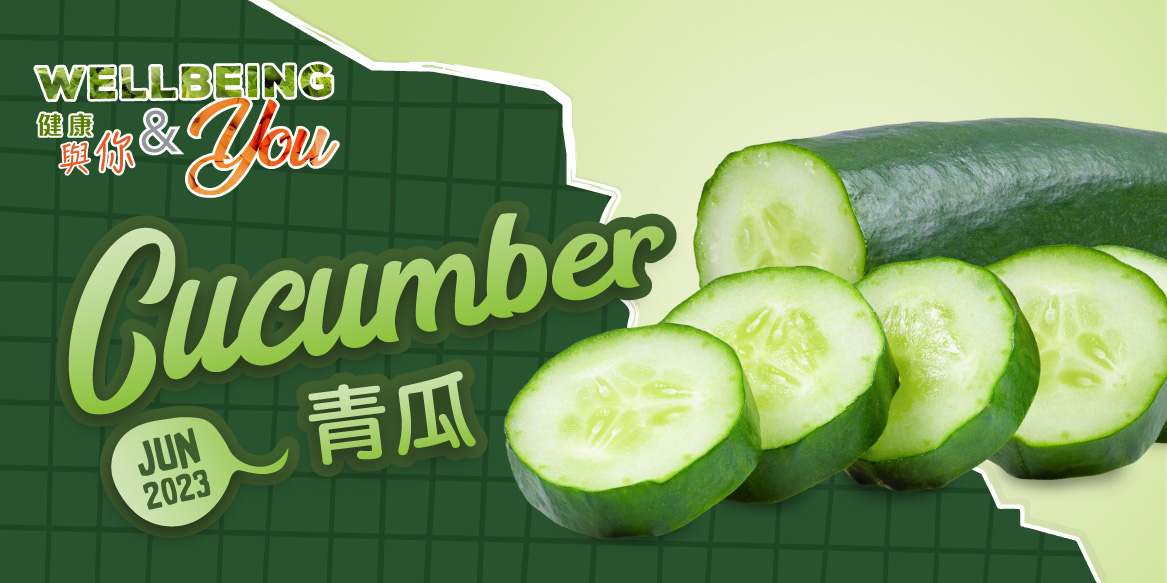[Wellbeing & You] Cucumber

Eat Seasonal
Cucumbers are a refreshing addition to many foods and drinks in the summertime. They grow well in greenhouses and in hydroponic farms indoors, so we can easily find cucumbers all year around these days. Since cucumbers like hot climate, their peak season is from May through August if they are planted traditionally outdoors. Store cucumbers in an airtight container in the refrigerator will keep them crispy and fresh for about a week.
Nutrition
Cucumbers are a versatile ingredient which goes well in a variety cuisine in different countries. Many cultures around the world have their own traditional cucumber dishes or drinks that visitors would find enjoyable.
Cucumbers can be prepared and served raw or cooked, fresh or preserved, warm or cold, in numerous ways that you may not have thought of. Some simple and popular dish ideas are fresh cucumber slices in infused water, spicy marinated cucumber salad, creamy cucumber salad and stir-fry cucumber with shrimps. Serving Asian marinated cucumber salad on the side or as snack is a great way to boost our vegetable intake! Keeping the peel on can retain the crispiness and nutrients of the cucumbers, such as dietary fiber, vitamins, and antioxidants. One large cucumber which is about 8-1/4 inches long (301g) not only provides more than 40% Daily Value (DV) of vitamin K to support healthy blood clotting and strong bones, but also offers 14% DV of copper and 10% DV of manganese that are important to our mental health.

In addition to the minerals found in cucumbers that are beneficial to our mental wellness, antioxidants from natural pigments in cucumbers are also being studied to prove their anticarcinogenic properties. Not many of us know that this ordinary looking vegetable is packed with plenty healthful nutrients with a surprisingly low calorie that is only 45kcal in one large cucumber.
Incorporate this nutritious produce in our diet can freshen up our taste buds on hot summer days and help keep our weight in check at the same time.
Sustainability
Cucumbers are one of the most common crops grown in hydroponic farms, which means plants are grown in water-based nutrient solution instead of soil. Hydroponic farming is a more sustainable form of cultivation that can reduce environment damage caused by deforestation and water pollution in conventional agriculture. Next time when you are shopping for cucumbers, look for the ones that are produced by a local hydroponic farm to take one more step in protecting our planet.
Compass Chef’s Recipe Sharing
Cucumber Yoghurt Cheesecake

Executive Chef
Compass Group Hong Kong Limited
| Ingredients |
| · 160g cake flour · 80g soft butter · 150g sugar · 40g gelatin · 350g cucumber, juiced · 450g cream cheese · 160g sugar · 100g Greek plain yogurt · 120g whipped cream |
| Method |
| 1) Preheat oven to 170⁰C (340⁰F) 2) In a medium mixing bowl, mix cake flour, butter and 150g sugar together 3) Transfer mixture and press them firmly to the base of a 20cm (8 inches) springform cake tin 4) Bake for 20min 5) Soak gelatin in 150mL cucumber juice for 5-10 minutes, or until soft, and then set aside 6) Combine the rest of the cucumber juice with the gelatin mixture 7) In a medium bowl, mix cream cheese and sugar until smooth 8) Add gelatin solution to the cream cheese mixture and then mix well 9) Add yoghurt and then mix again 10) Pour mixture into the baked cake base 11) Refrigerate for at least 2 hours 12) Decorate with whipped cream and serve |

Reference:
- My Food Data – Cucumber with Peel Raw. Available at: https://tools.myfooddata.com/nutrition-facts/168409/wt2/1 . Access on 5May2023.
- Iberdrola – What is Hydroponics and Advantages. Available at: https://www.iberdrola.com/sustainability/what-is-hydroponics-and-advantages. Access on 5May2023.

